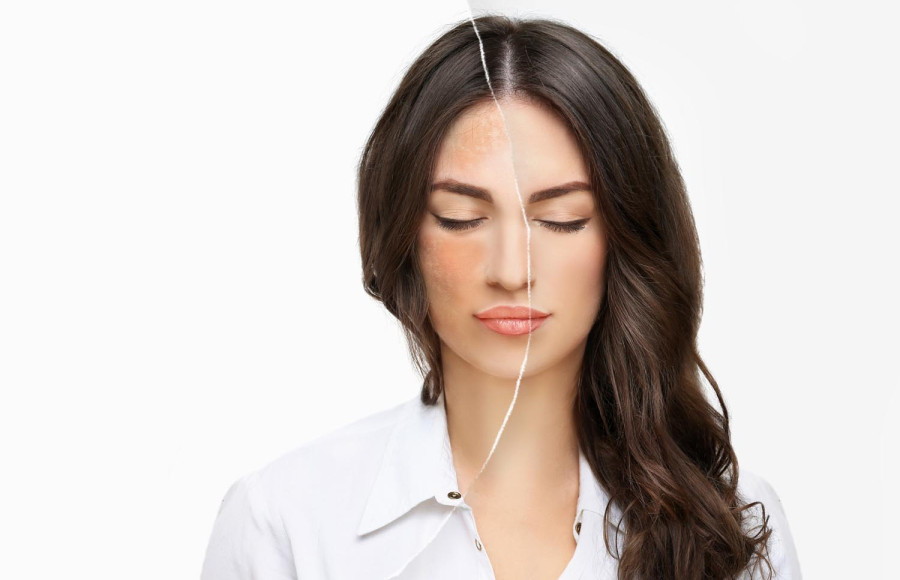Culture & Lifestyle
A look at hyperpigmentation
This disorder can be prevented or minimised through lifestyle modifications and protective measures.
Sanskriti Pokharel
Hyperpigmentation, which appears as dark spots on the skin, can make you reluctant to look at your reflection in the mirror. It may also lead to unwanted skin care suggestions from friends and family. In the worst cases, it can affect your self-esteem so much that you avoid going out in public.
Dr Vikash Paudel, a consultant dermatologist at Patan Hospital, Elite Health Clinic, and Shankhamul Healthcare, explains hyperpigmentation, its causes, and the methods to prevent it.
What is hyperpigmentation?
Hyperpigmentation occurs when certain skin parts become darker than the surrounding area. This darkening occurs when an excess of melanin, which is responsible for determining skin and hair colour, is produced.
Hyperpigmentation can mostly develop on sun-exposed areas such as the face, neck, chest, and arms. Some people might have hyperpigmentation by birth, which is difficult to remove.
What are some misconceptions about this skin disorder?
It's a common misconception that all hyperpigmentation issues are identical. There are many kinds of skin pigmentation, each with its causes and treatments.
The other misconception is that natural remedies are always safe and effective. While some natural ingredients may help, many need more scientific evidence and can worsen the situation.
Secondly, people believe that it will naturally fade without any treatment. While some types may fade over time, others can persist for years without appropriate intervention.
Lastly, people associate fear with medical treatments and creams to diminish hyperpigmentation, thinking they would deteriorate the skin further. However, medical creams containing depigmenting agents are effective and not harmful when used correctly under medical supervision.
How does lifestyle impact the development of hyperpigmentation?
Lifestyle factors, including diet, sun exposure, sleep, stress, etc., play a significant role in the development of hyperpigmentation.
Continuous exposure to mobile phones, tablets, TVs, Flashlights, LED screens, etc., might develop the disorder, as visible light also stimulates melanocytes to produce melanin pigment and cause hyperpigmentation.
Lack of essential nutrients, such as vitamins A, C and E, can impair the skin’s ability to heal and protect itself from environmental damage, contributing to pigmentation issues.
Prolonged and unprotected exposure to ultraviolet (UV) radiation from the sun or any UV light sources is also one of the leading causes of hyperpigmentation. Moreover, irritating skin care products can damage the skin barrier and lead to inflammation.
Poor sleep can also increase stress and inflammation, contributing to skin issues.

Is it preventable?
Of course, it can often be prevented or minimised through lifestyle modifications, protective measures, and proper skin care practices. However, some genetic, congenital and hormonal pigmentation are not preventable. Keeping the skin well-moisturised goes a long way, which can help prevent inflammation and pigmentation issues.
Using a broad-spectrum sunscreen with an SPF of at least 30 every day, even on cloudy days or when you're inside, can help prevent hyperpigmentation from getting worse and protect against new spots, as UV rays can penetrate clouds. Reapplying sunscreen every two hours outside and immediately after swimming or sweating is also very effective.
Regular, gentle exfoliation does wonders in removing dead skin cells and preventing clogged pores, reducing the risk of post-inflammatory hyperpigmentation from acne.
Moreover, incorporating products containing antioxidants like vitamins C and E into your skincare routine protects against free radical damage and promotes an even skin tone.
Stress management techniques, such as meditation, exercise, and relaxation practices, can help maintain hormonal balance and reduce skin issues.
What home skincare routines do you recommend for managing or preventing hyperpigmentation?
Managing hyperpigmentation at home involves tailoring your skincare routine to your skin type. The main skin types include normal, dry, oily, combination, and sensitive. Therefore, choosing skincare products and home remedies that suit your skin type is essential.
Avoid oil-based creams and pastes for oily skin, and avoid gels that can further dry out dry skin. Moreover, be particularly cautious when selecting skincare products and medications if you have sensitive skin.
A variety of household ingredients can help reduce hyperpigmentation. Green tea extract reduces melanin production and shields the skin from UV damage. Aloe vera offers soothing and healing properties to hyperpigmentation, whereas turmeric, rich in curcumin, delivers powerful anti-inflammatory benefits.
Also, I always recommend to my clients that they keep their skin well-hydrated, as dryness can exacerbate hyperpigmentation. Lastly, a diet rich in antioxidants can support skin health and reduce pigmentation.
If you notice any irritation or allergic reactions from home remedies, stop using the product immediately, wash the affected area with water, and consult a dermatologist.




 9.89°C Kathmandu
9.89°C Kathmandu

.jpg&w=200&height=120)













